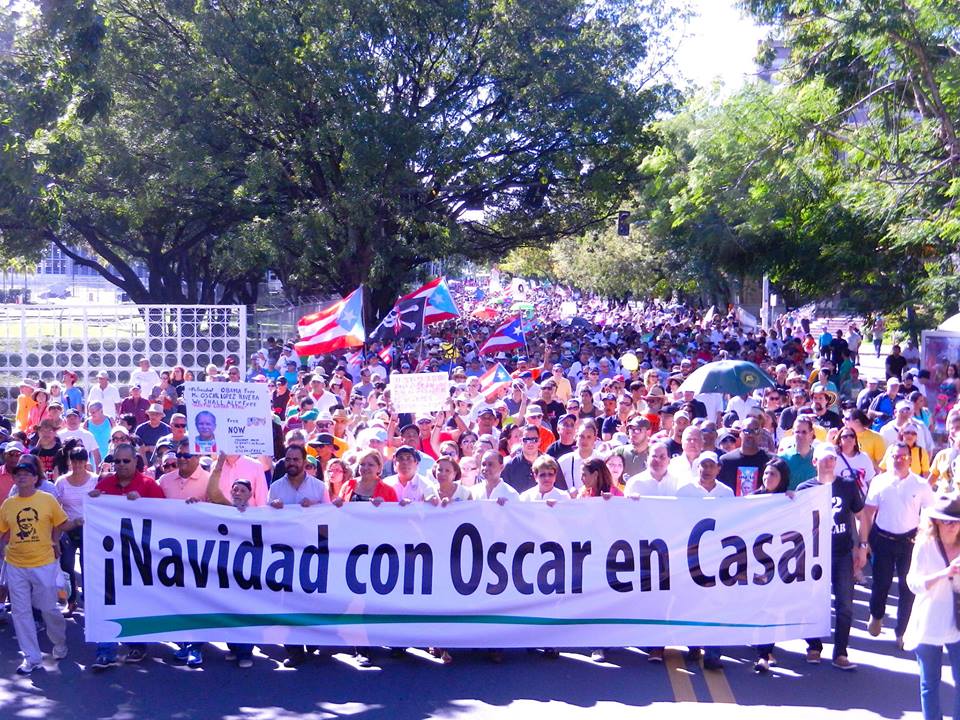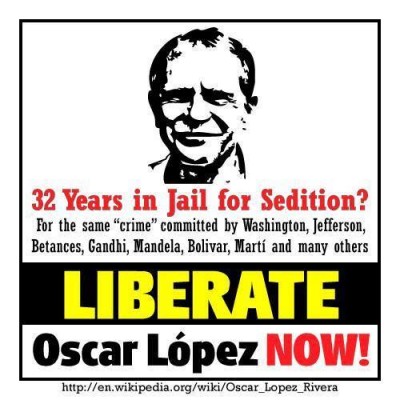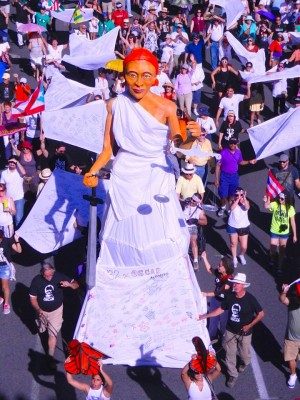 [1]
[1]Thousands gathered in Hato Rey, the economic hub of the capital city of San Juan, on Saturday, November 23, to demand the release of Oscar López Rivera from prison. The banner says “Christmas with Oscar back home!” Image taken from the Facebook page 32 x Oscar [2] [es].
Oscar López Rivera [4] has been imprisoned for 32 years, and counting, by the U.S. federal government in Terre Haute, Indiana. The charge is “seditious conspiracy,” even though he was never convicted of crimes that resulted in death or injury to anyone. His lawyers have reported he has been subjected to inhumane treatment [5] during his incarceration. They have also said he has been singled out for punitive treatment because of his political affiliations, which prompted Amnesty International [6] to criticize the conditions under which which he and other political prisoners were being held.
And yet, through it all, Oscar's spirit remains serenely unbroken. So much so, that in 1999 he refused the conditional clemency [7] offered by President Bill Clinton, saying that it would be like being in prison outside of prison.
 [8]
[8]Image taken from the Facebook page Free Oscar López Rivera Now [9].
Looking around as more and more people arrived to join the march, I marveled at the diversity around me. The campaign to secure Oscar López Rivera’s release from prison is supported by people from all walks of life, of all ages, and across the political spectrum. Granted, the most vocal sector calling for his release is still associated with the political left. Nevertheless, it has reached to a point where it doesn't matter if you're in favor of independence, statehood, or something in between for Puerto Rico.
 [10]
[10]An effigy of Lady Justice rises over the crowd at the protest to demand Oscar López Rivera's release. Image taken from the Facebook page 32 x Oscar [2] [es].
As in any decent Puerto Rican protest, the mood was festive. Plena [12] rhythms and artistic creativity abounded. Outsiders often find this strange, possibly because they're more used to protests more serious in tone, more solemn and angry, even when it is a peaceful one. This isn't to say that people weren't serious about what they were trying to accomplish, or that they weren't angry about Oscar López Rivera's incarceration. Rather, this is a distinct characteristic of Caribbean societies, and in a society like Puerto Rico's, which, like all Caribbean countries, has historically been oppressed by an external power that tries to build itself up in the minds of people as the model of all that is civilized, cultured, enlightened, and just plain better, there is no more effective way to deflate that power. Humor and the carnivalesque are, in other words, an important form of resistance.
It was only later, when I thought about the poor coverage the march had received in the international mainstream news, that I realized there was no chopper overflying the area. This was mind-boggling, considering that simultaneous protests were taking place in New York, Chicago, and Washington, DC, and that there were a many as 40,000 [13] people gathered to protest in Puerto Rico alone. René Pérez, from the band Calle 13 [14], had lent his support and was participating in the march held in New York. Calle 13's tweet became the most relevant topic on Twitter related to President Barack Obama's Twitter account:
Marchando rumbo a Brooklyn. Libertad para Oscar Lopez @BarackObama [15] Free Oscar Lopez! pic.twitter.com/cYtrwsGyqK [16]
— Residente C13/ RC13 (@Calle13Oficial) November 23, 2013 [17]
I must confess that until about a year and a half ago, I knew practically nothing about Oscar López Rivera. As I gradually learned about him, I couldn't help but feel that the cause in favor of his release from prison should also be my cause, just as his cause to free Puerto Rico from colonial rule is also my cause, one that I pursue in my own small way every day.
Seeing the unity of purpose show, if only for the briefest of moments, on that Saturday afternoon by such a large, diverse crowd of Puerto Ricans renews my faith that someday we may, perhaps, unite to demand the decolonization of Puerto Rico once and for all.
That, I believe, is the secret to the remarkable resilience of Oscar López Rivera's spirit: His conscious, defiant resistance that translates into a faith that rejects the nihilism of self-fulfilling despair, in spite of the temptation to retreat into the seductive silence of comfortable passivity.